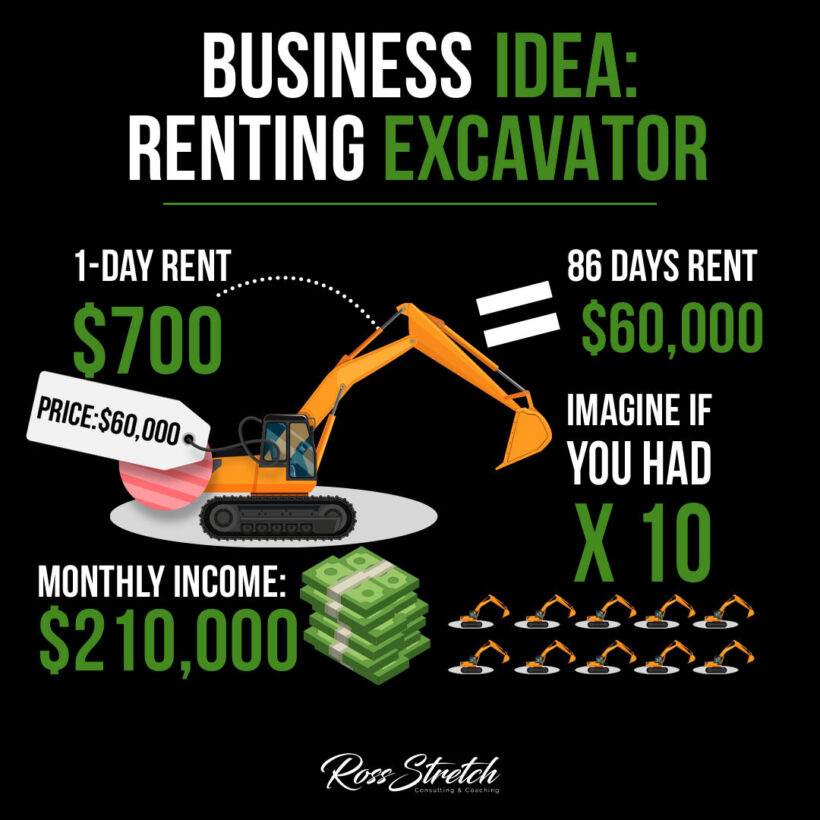Starting a business in equipment rental, particularly excavators, can be incredibly profitable. With construction projects, landscaping jobs, and large-scale building needs constantly on the rise, excavators are in high demand. By investing in a few excavators and renting them out daily, you can generate a steady stream of income. Here’s how you can make the most of this lucrative business idea.
1. The Economics of Renting an Excavator
Excavators are expensive machines, with new models priced around $60,000 or more. However, the high purchase cost translates to a high rental rate, with daily rental fees averaging around $700. This allows for a rapid return on investment (ROI), as just 86 rental days cover the cost of a $60,000 excavator.
- Daily Rental Rate: $700 per day
- Return on Investment: 86 days of rentals cover the cost of one excavator
- Monthly Income Potential: Renting 10 excavators could yield around $210,000 if rented daily
These figures illustrate the potential of a well-maintained fleet. High demand for excavators, particularly in construction-heavy areas, makes this a promising business model.
2. Why Excavators Are in Demand
Excavators are versatile machines, used for a range of applications from digging foundations to demolishing structures, landscaping, and material handling. Businesses across construction, landscaping, and mining industries rely on them for daily operations, often renting them to avoid the high upfront cost of purchase and maintenance.
- Industries That Use Excavators:
- Construction: Essential for building foundations, grading land, and trenching
- Landscaping: Used in large-scale landscaping and tree removal projects
- Demolition: Vital for breaking down structures in residential and commercial projects
- Mining and Earthmoving: Required for material extraction and transport
Since buying excavators outright can strain company budgets, many opt for rentals, ensuring there’s a constant demand for rental units.
3. Initial Investment and Financing Options
Purchasing excavators for a rental business requires substantial capital. However, financing options make it feasible for entrepreneurs to get started without needing to pay the full price upfront. Many equipment dealerships and financial institutions offer leasing and financing plans that allow business owners to spread out the cost over several years.
- Financing Options:
- Equipment Loans: Many banks offer loans specifically for heavy equipment purchases.
- Leasing: Some dealers provide lease-to-own options, allowing you to generate rental income while paying off the excavator.
- Government Grants: In some regions, grants are available for small businesses investing in construction equipment.
Choosing the right financing option can help you scale your fleet while maintaining manageable monthly payments, enabling you to start the business with less financial strain.
4. Maintenance and Operating Costs
Regular maintenance is crucial to keep excavators in rental-ready condition. From oil changes to hydraulic fluid checks and track repairs, routine maintenance ensures equipment longevity and customer satisfaction. Budgeting for operating and maintenance costs is essential for profitable rental operations.
- Maintenance Costs:
- Regular Servicing: Estimated at around $500-$1,000 per service, depending on the frequency of use.
- Repairs: Parts like hydraulic lines and tracks may need periodic replacement, averaging $1,500-$3,000 annually.
- Insurance and Permits: Liability and equipment insurance are necessary to protect against potential damage or theft, adding a few hundred dollars per month.
Factoring in maintenance costs ensures that your profit margins remain high while keeping the equipment in optimal condition.
5. Marketing and Attracting Clients
To attract clients, establish a strong local presence and consider digital marketing strategies. Here are a few effective ways to market your excavator rental business:
- Networking with Local Contractors: Building relationships with contractors and construction companies can lead to steady, repeat business.
- Online Listings: List your rental services on sites like Craigslist, Facebook Marketplace, and local business directories.
- SEO for Your Website: Optimize your website for search engines so that people searching for “excavator rentals near me” can find you.
- Targeted Advertising: Use Google Ads or Facebook Ads to reach a local audience actively looking for equipment rentals.
Offering discounts for extended rentals or loyalty programs for repeat clients can also enhance customer retention.
6. Expanding Your Fleet for Increased Profits
Once you’ve established a steady flow of clients and generated consistent income, consider expanding your fleet. As the infographic shows, owning multiple excavators can significantly increase monthly income. For example, owning 10 excavators and renting them out daily could yield up to $210,000 per month, assuming consistent demand.
- Benefits of Fleet Expansion:
- Higher Income Potential: More equipment means more rental revenue.
- Better Client Retention: With a larger fleet, you’ll be more likely to have availability when clients need it.
- Bulk Service Discounts: Servicing multiple machines can sometimes be done at a lower rate, reducing maintenance costs per unit.
Expanding your fleet may require additional financing or reinvesting profits, but the income potential grows with each additional unit.
Conclusion
Starting an excavator rental business is a high-investment venture with impressive profit potential. By investing in just one excavator and renting it out regularly, you can cover the cost within a few months and generate a steady income. For entrepreneurs willing to invest in a fleet, the earning potential is substantial, with the opportunity to scale over time. With the right financing, maintenance, and marketing strategies, renting excavators can be a lucrative business in today’s construction-driven economy.


